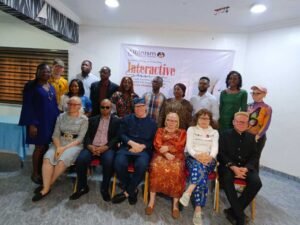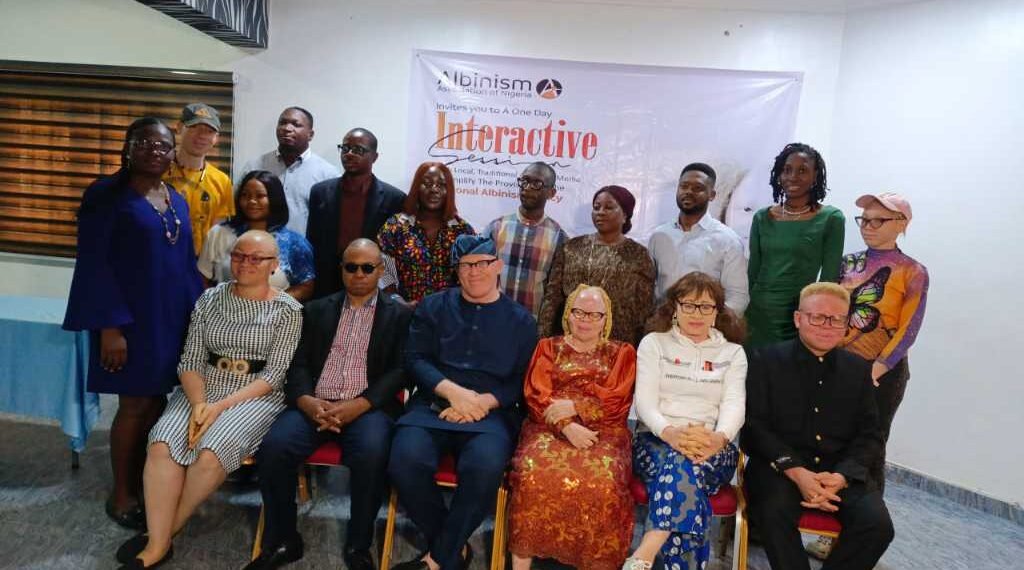KEYNOTE PRESENTATION ON THE NATIONAL ALBINISM POLICY AND ITS RELEVANCE TO LOCAL, TRADITIONAL, AND NEW MEDIA AT A ONE DAY INTERACTIVE MEETING WITH THE MEDIA ORGANIZATIONS ORGANIZED BY THE ALBINISM ASSOCIATION OF NIGERIA (AAN), A PROJECT FUNDED BY DISABILITY RIGHTS FUND (DRF) ON THE 17TH DAY OF SEPTEMBER, 2024
AT ELOMAZ HOTEL MARYLAND, LAGOS STATE, NIGERIA
Good morning, distinguished members of the media, representatives of various organizations, advocates, and stakeholders.
I am honored to stand before you today as the Executive Director of the Albinism Association of Nigeria (AAN) to present the National Albinism Policy and its relevance to you (media organizations: local, traditional, and new media). This policy represents a milestone in our efforts to ensure that persons with albinism in Nigeria are recognized, respected, and supported by society and the government.
This one-day interactive session, generously supported by the Disability Rights Fund (DRF), who by divine intervention, approved this project with a support (grant) on Inclusive Education in Nigeria. A project which is designed specifically to avail us with the opportunity to interact and make meaningful efforts that will help to actualize the vision, mission, core objectives, policy targets, outcomes, review and implementation strategies that will help to advance majors to facilitate the review and implementation of the National Policy on Albinism in Nigeria.
As an association, we are extremely aware of the barriers and obstacles that persons with albinism encounter in their pursuit of education. From discrimination and stigma to inadequate facilities and lack of awareness, the road to inclusive education is fraught with challenges. However, with the support of the Disability Rights Fund, we are empowered to make meaningful strides towards overcoming these barriers and creating a more inclusive learning environment for persons with albinism across Nigeria.
Overview of the National Albinism Policy
Albinism is a genetic condition that results in a lack or absence of melanin pigment in the skin, hair, and eyes. In Nigeria, albinism is seen as a curse by some people and many PWAs face discrimination, stigmatization, and even violence.A child with Albinism in Nigeria faces numerous challenges, including discrimination and social exclusion. Nigerian society is largely ignorant about the condition and the challenges that come with it. Persons with Albinism in Nigeria are also at an increased risk of skin cancer due to the lack of melanin pigment in their skin. Exposure to the sun’s harmful ultraviolent (UV) rays can lead to skin damage and ultimately, skin cancer. Unfortunately, many PWAs in Nigeria cannot afford to buy sunscreen and other protective clothing due to poverty.
It is against this background that the Federal Government has taken keen interest in Albinism and the challenges faced by PWAs in terms of their skin problems, vision, low self-esteem, myths, discrimination and stigmatization.
To mitigate the learning challenges faced by PWAs and create educational access, a Blueprint on Albinism Education in Nigeria was developed by the Federal Ministry of Education. Consequently, the need for a more encompassing policy that will address the multi-faceted needs of Persons with Albinism became imperative.
In 2012, a Ministerial Committee was set up by the then Honourable Minister of State for Education, Chief (Barr.) EzenwoNyesomWike, to develop a National Policy on Albinism. This immediately started with the involvement of multifarious committee comprising of representatives from Federal Ministries of Education, Health, Women Affairs and Social Development, Justice, Finance, Labour and Employment; Office of the Head of Civil Service of the Federation and many other parastatals and private organizations.After the draft and justification of the policy through the appropriate quarters, it was finally accented in 2019 to last for a period of five years after which a review will be done to keep space with the current humanitarian and environmental activities
But unfortunately, this was not implemented as intended and up till now, PWAs are suffering and it seems there is no hope even though a national policy supporting our course of living was initiated. Hence the need to ensure review and implementation is necessary because of the prevailing negative circumstances faced by PWAs.
The National Albinism Policy is a comprehensive framework designed to address the unique challenges faced by persons with albinism in Nigeria. The policy aims to promote social inclusion, economic empowerment, and access to education and healthcare for individuals with albinism.

Why Media Involvement is Essential
The media serves as both the mirror and the magnifying glass of society. It reflects societal values but also has the power to magnify critical issues that require collective action. For persons with albinism, media involvement in raising awareness is essential for several reasons:
- Combating Myths and Stigmas: Many people, particularly in rural areas, still hold misconceptions about albinism. The media can dispel harmful myths, particularly those linked to violence against persons with albinism.
- Encouraging Policy Implementation: Media coverage can shine a spotlight on government efforts and hold stakeholders accountable for the full implementation of the National Albinism Policy.
- Promoting Positive Representation: It is important for persons with albinism to be portrayed positively in the media, as contributing members of society rather than victims. Media stories that highlight their successes, talents, and contributions can significantly shift public perception.
The Relevance of the Policy to Local, Traditional, and New Media
As media professionals, your role in advancing the goals of the National Albinism Policy cannot be overstated. As an organization with a powerful tool in shaping narratives, changing societal attitudes, and driving public discourse based on the various forms you play your official roles, we believe that the media can play a key role in amplifying the policy:
Local media outlets are uniquely positioned to directly engage with communities where harmful stereotypes and discrimination against persons with albinism are most prevalent. By producing region-specific content such as radio programs, community-based reports, and local interviews you can bridge the gap between national policies and grassroots advocacy. The power of local language broadcasts and community influencers can help demystify albinism and educate rural populations on the true nature of the condition.
Traditional media such as television, radio, and print remains one of the most effective means of reaching a broad audience. Investigative journalism, special documentaries, and news reports highlighting the challenges and triumphs of persons with albinism can raise public consciousness. Regular feature stories on the implementation of the National Albinism Policy, as well as sensitization campaigns, can drive home the message of inclusion.Traditional media also has the opportunity to invite key policymakers and advocates to live discussions, where policy implementation and challenges can be addressed in real-time, sparking critical conversations.
In the digital age, new media platforms such as social media, blogs, podcasts, and online news outlets have unprecedented reach and influence, especially among the youth. The sparkling nature of content on platforms like Twitter, Instagram, and YouTube can be harnessed to spread positive stories and correct misconceptions about albinism. New media can also provide a platform for persons with albinism to share their own experiences, giving them agency in telling their stories.Additionally, hashtag campaigns, short educational videos, and visual storytelling on these platforms can play a crucial role in mobilizing public support for the rights of persons with albinism.
Call to Action
As we move forward, I want to challenge each of you whether you represent local, traditional, or new media to take this policy and its provisions to heart. The stories you tell, the platforms you use, and the messages you craft will have a lasting impact on the lives of persons with albinism in Nigeria. Together, we can make sure that no one is left behind and that the National Albinism Policy becomes a lived reality for every person with albinism in our country.
Conclusion
In conclusion, the National Albinism Policy is not just a document; it is a call for action. Through your platforms, you have the ability to bring the policy to life, to ensure that its provisions are not just words on paper but rights that are actively respected and protected.
Thank you for your attention, and I look forward to working with you as we continue to advocate for the rights, dignity, and inclusion of persons with albinism.
Bisi Bamishe
Executive Director
Albinism Association of Nigeria (AAN)



